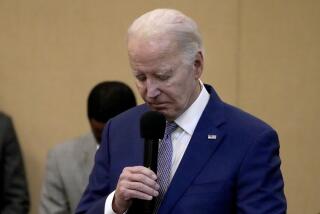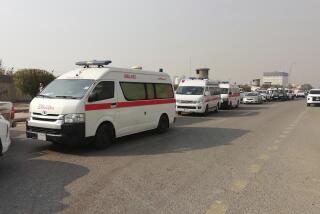Suicide Bombing Kills 18 at Iraqi Army Center
- Share via
BAGHDAD — At least 18 people were killed and dozens were wounded when a car bomb exploded this morning in a crowd outside an Iraqi army recruiting center here, officials said.
The suicide attack at the small Muthanna airport, which also houses U.S. troops, was the latest in a series of deadly strikes in the days before an interim Iraqi government takes power.
An attack on the complex in February reportedly killed 20 to 25 Iraqis who were lined up to apply for jobs as soldiers.
Elsewhere in Iraq, three U.S. troops were killed and nearly two dozen were injured in a rocket attack Wednesday on a U.S. base in Balad, north of Baghdad. The deaths were the first U.S. military fatalities reported in several days and bring the unofficial toll to about 835 since the invasion last year.
A bomb killed six people, believed to be Iraqis, in the western city of Ramadi, the military reported.
Though violence around the nation continued, a militant cleric whose Shiite Muslim forces have clashed repeatedly with U.S. troops ordered his militia to leave Najaf on Wednesday, signaling a desire to defuse tensions in the holy city.
Muqtada Sadr, who has demanded the immediate departure of U.S. troops from Iraq, directed the militiamen who do not live in Najaf to return to their homes.
“We ask for those who helped us to go back to their normal life,” Sadr said in a statement read by his chief spokesman, Qais Khazali.
Sadr’s conciliatory tone most likely reflected his stated desire to bring his movement into the Iraqi political process and not be excluded when sovereignty is returned to Iraq at the end of the month. U.S. officials, notably L. Paul Bremer III, Washington’s top administrator in Iraq, have balked at allowing the virulently anti-U.S. Sadr a political role.
But interim President Ghazi Ajil Yawer this week welcomed Sadr’s participation in Iraq’s evolving political life -- and President Bush said it was up to the Iraqis to decide the fate of the cleric, who is wanted in connection with the killing of another Shiite leader.
The significance of Sadr’s gesture was unclear because many of his fighters live in the Najaf area and probably will stay on. Many more of his followers are from the eastern Baghdad district known as Sadr City, where clashes with U.S. troops have been almost nightly.
Still, the withdrawal of out-of-town fighters from Najaf was part of an accord reached with Sadr this month in an attempt to end weeks of fighting that have left hundreds of his men dead in the holy cities of Najaf, Kufa and Karbala. U.S. officials, who once vowed to “kill or capture” Sadr, have backed off from direct confrontation in Najaf.
The cleric’s gesture also comes as violence has virtually shut down Iraq’s economic lifeline -- its capacity to export oil. A pair of attacks on pipelines near the southern city of Basra has halted most exports through the Persian Gulf for at least several days, until repairs can be made, officials said.
Sabotage already has virtually shut down exports from the northern oil fields, officials said, and an explosion was reported Wednesday at a northern pipeline.
Sabotage has cost Iraq more than $200 million, interim Prime Minister Iyad Allawi said. Thousands of security personnel are assigned to guard oil and power facilities, but it is impossible to guard the thousands of miles of pipeline.
“They are clearly destabilizing and disrupting the reconstruction process here in Iraq,” said Maj. Ian Clooney, a spokesman for British forces in Basra.
Meanwhile, Ghazi Talabani, a top oil executive in the northern region, was assassinated outside his home Wednesday in the city of Kirkuk. He was a cousin of a Kurdish leader, Jalal Talabani of the Patriotic Union of Kurdistan.
Analysts said it appeared that other oil-producing nations could make up for Iraq’s lost exports, but only if the pipelines could be repaired quickly and production was not disrupted by more attacks.
Iraq’s exports have been averaging about 1.8 million barrels a day in recent weeks, close to prewar levels. Most of it has flowed through the southern pipelines because repeated acts of sabotage have kept the northern lines out of commission for extended periods.
“That’s a couple percent of world oil supply,” said John Felmy, chief economist for the American Petroleum Institute. “As tight as markets are now, any time you lose any supply, it’s not good news.”
Jamal Qureshi, a market analyst for PFC Energy, an advisory firm in Washington, said oil traders took the attacks in stride because Saudi Arabia and other producers appeared to have enough spare capacity to temporarily replace Iraqi exports.
The muted reaction was reflected in crude oil futures prices, which rose 13 cents to $37.32 a barrel on the New York Mercantile Exchange.
“For the broader global market, it’s manageable,” Qureshi said. “For Iraq, it’s extremely significant. They’ve completely halted exports now, probably for at least a week or so. I imagine they can get the damage fixed, but they’re clearly very vulnerable. The markets will get very nervous if this ends up lasting longer.”
Qureshi said he feared that opponents of the U.S.-led occupation and the new transitional government would stage more attacks on the southern pipelines, choking off Iraq’s principal source of revenue and stretching world production capacity to its limits.
“It was only a matter of time,” he said. “Now the insurgents are clearly getting serious about doing it. I think this is fairly ominous.”
In Ramadi, a Sunni Muslim stronghold long hostile to the U.S.-led coalition, a policeman was among six killed by a roadside bomb, the U.S. military said. Among the suspects picked up by Marines were six members of the Iraqi Civil Defense Force -- one of the services expected to play a central role in providing security after the hand-over of power June 30.
Suspect loyalties among Iraqi police and other security personnel is a grave problem, U.S. commanders say.
Also Wednesday, U.S. Deputy Defense Secretary Paul D. Wolfowitz, an architect of the war, met with the new Iraqi leadership.
Special correspondent Khalil and staff writer McDonnell reported from Baghdad, and staff writer Vieth from Washington. Special correspondent Raheem Salman in Baghdad contributed to this report.
More to Read
Sign up for Essential California
The most important California stories and recommendations in your inbox every morning.
You may occasionally receive promotional content from the Los Angeles Times.













